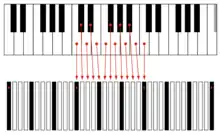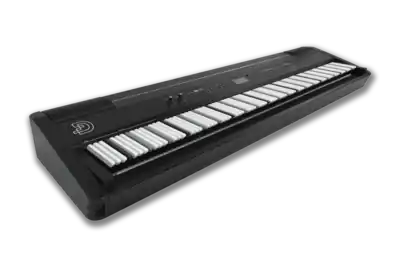Dodeka keyboard
The Dodeka Keyboard Design is an isomorphic keyboard invented and designed by Jacques-Daniel Rochat. It is similar to a piano keyboard but with only a single row of keys containing each chromatic note.[1][2][3] The keys corresponding to C, E and A flat are highlighted to provide visual landmarks. The creators aimed to create a rational and chromatic approach to music and performance.[4] As an isomorphic keyboard, any musical sequence or interval has the same shape in each of the 12 keys.


Music notation
The Dodeka design was developed together with the Dodeka Music Notation.[5][6][7] It consists of a four-line chromatic staff, and represents rhythms only using the visual length of a bar on the staff, reminiscent of the appearance of "piano roll" in digital audio workstations.
See also
References
- "Isomorphic Instruments | Wiki | The Music Notation Project". musicnotation.org. Retrieved 2018-10-19.
- "This electric piano claims to make it easy for everyone to learn keys". FACT Magazine: Music News, New Music. 2016-12-19. Retrieved 2018-10-19.
- Andres, Perez-Lopez; Kientz, Bertrand (2015). "BIGRAM EDITOR: A SCORE EDITOR FOR THE BIGRAM NOTATION" (PDF). TENOR.
- guest (2016-12-17). "New Keyboard Design, DODEKA, Promises A More Rational Approach To Music Education & Performance". Synthtopia. Retrieved 2018-10-19.
- "Startup Dodeka rethinks the keyboard... and music notation". musically.com. Retrieved 2018-10-19.
- "DODEKA Reinvents Writing And Playing Music". Sonicstate. Retrieved 2018-10-19.
- Rochat, Jacques-Daniel (2018). Dodeka : la révolution musicale. Chexbres: Crea 7. ISBN 9782970127505. OCLC 1078658738.
External links
- The Music Notation Project, list of instruments featuring the isomorphism principle
- AltKeyboard
- Dodeka Music, Dodeka keyboard website